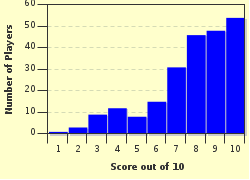Quiz Answer Key and Fun Facts
1. Paul is writing to a church that he founded whilst on his second missionary journey. Which of the following statements about the church is true?
2. Which of these emoticons best sums up Paul's mood in writing to the Philippians?
3. To whom does Paul address the letter?
4. At the beginning of chapter 2, what does Paul say will make his joy complete?
5. As Paul develops his argument in chapter 2, he appears to quote from an existing text that scholars generally agree to be which of the following?
6. "Watch out for those dogs, those men who do evil, those mutilators of the flesh." (Philippians 3 v. 2)
As often occurs in his letters, Paul warns against those who continue to advocate the need for Christians to be circumcised. In so doing he reveals which piece of personal information?
7. Philippi was a Roman colony in Greece. Paul contrasts his readers with many of those that live around them by saying that their citizenship is where?
8. Paul had trusted companions who supported him by overseeing the work he had begun. Which of these, whom elsewhere he describes as a young man, does he hope to be able to send to Philippi soon?
9. "_____ in the Lord always. I will say it again: _____!" (Philippians 4 v. 4)
Which is the missing word from this New International Version quotation that can be said to epitomise the entire epistle?
10. In the closing verses, Paul implores Euodia and Syntyche, two members of the Philippian church, to "agree with each other in the Lord". He also refers to a third person whom he describes as one of his fellow workers. Who is this man that shares a name with an early Christian saint, writer and bishop of Rome?
Source: Author
glendathecat
This quiz was reviewed by FunTrivia editor
CellarDoor before going online.
Any errors found in FunTrivia content are routinely corrected through our feedback system.

